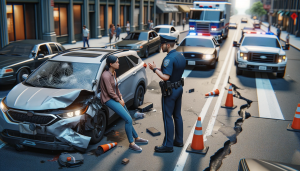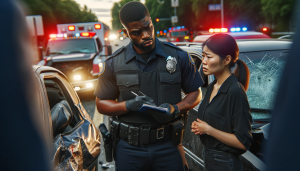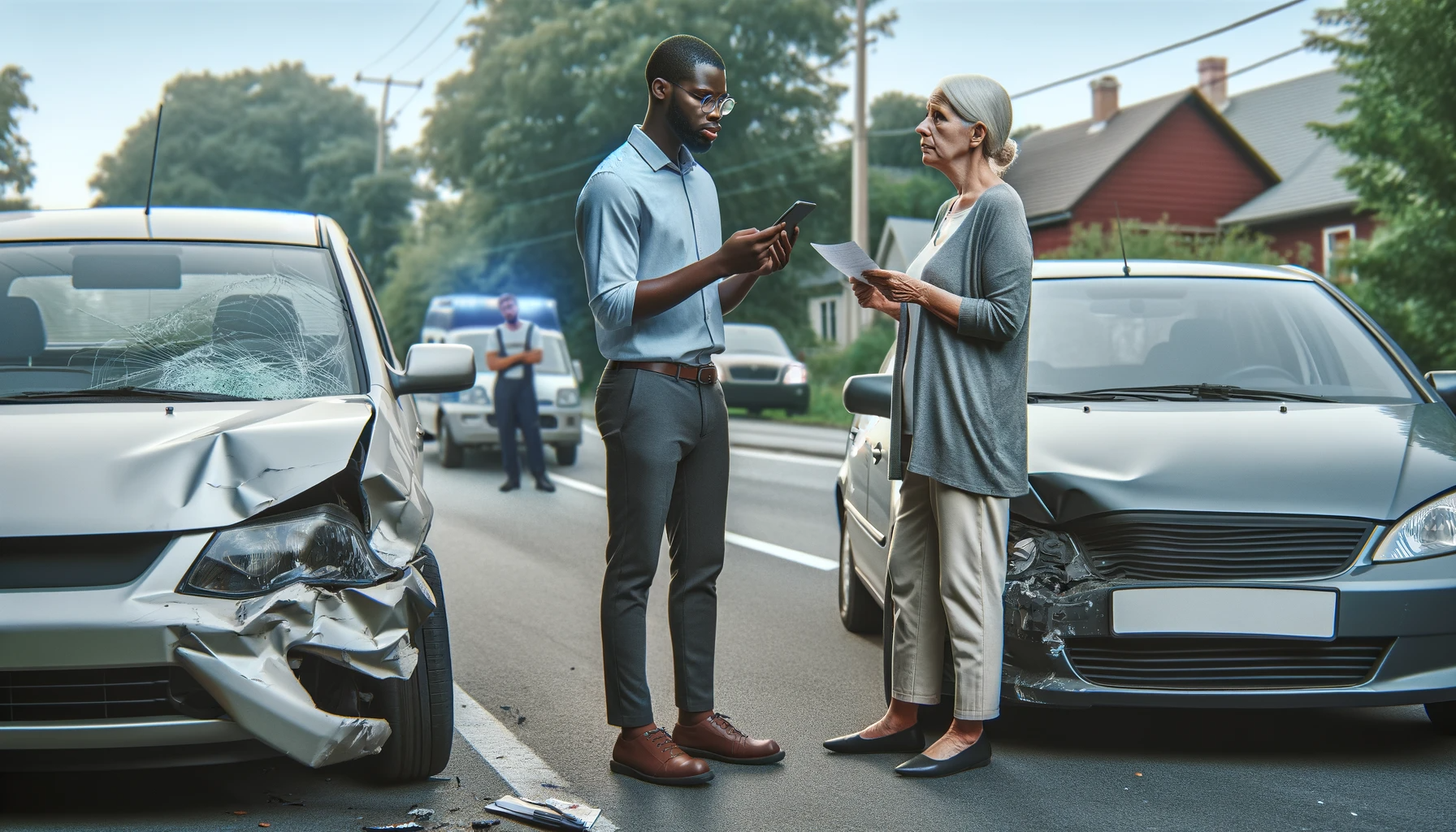Texting and Driving: Legal Resources for Auto Accident
Introduction
Texting and driving is one of the most dangerous distractions on the road today. Despite the risks, many drivers continue to engage in this hazardous behavior, leading to countless accidents, injuries, and fatalities each year. Understanding the legal landscape surrounding texting and driving is crucial, whether you're a victim or the responsible party in an accident. This article will explore the dangers of texting and driving, the laws that govern it, and the legal resources available if you're involved in an accident.

The Dangers of Texting and Driving
Texting while driving is often referred to as a form of "distracted driving," but it's more than just a distraction—it's a deadly risk. According to the National Highway Traffic Safety Administration (NHTSA), texting while driving increases the risk of a crash by 23 times compared to driving without distractions. In 2020 alone, distracted driving claimed over 3,000 lives, with a significant portion of these deaths attributed to texting.
Texting requires visual, manual, and cognitive attention from the driver. This means when you text, you're not just taking your eyes off the road; you're also diverting your hands from the wheel and your mind from driving. This triple threat makes texting one of the most dangerous activities to engage in while behind the wheel.
Laws Against Texting and Driving
Laws regarding texting and driving vary from state to state, but the trend is clear: authorities are cracking down on this risky behavior. In the United States, 48 states, along with Washington D.C., Puerto Rico, Guam, and the U.S. Virgin Islands, have banned texting for all drivers. In many states, these laws are classified as "primary enforcement," meaning that an officer can pull you over solely for texting while driving.
Penalties for texting and driving can range from fines and points on your driver's license to more severe consequences, such as license suspension or even jail time, especially if texting leads to a serious accident.
Legal Consequences of Texting and Driving
If you're caught texting and driving, the legal repercussions can be significant. Beyond the immediate penalties like fines or points on your license, you could face civil or even criminal charges if your actions result in an accident.
In civil court, you may be sued for damages if another party is injured due to your negligence. These lawsuits can seek compensation for medical expenses, lost wages, and pain and suffering. In more severe cases, such as accidents resulting in death, you could be charged with vehicular manslaughter, a criminal offense that carries heavy penalties, including imprisonment.
What to Do Immediately After an Accident
If you're involved in an accident where texting and driving is suspected, your actions immediately following the crash are crucial. First and foremost, ensure everyone's safety and call emergency services. If possible, move your vehicle out of traffic to avoid further collisions.
Next, document everything. Take photos of the scene, exchange information with the other driver, and gather contact information from any witnesses. It's also essential to get a police report, as this document can be critical in proving fault later on.
Finding Legal Assistance
Navigating the legal aftermath of a texting and driving accident can be overwhelming, which is why finding the right legal assistance is vital. Start by researching attorneys who specialize in
car accidents or
personal injury law. Look for lawyers with experience in handling cases involving texting and driving, as they will be familiar with the nuances of these cases.
If you're unable to afford an attorney, don't despair. Many legal aid services offer assistance based on your income level, and some lawyers work on a contingency fee basis, meaning they only get paid if you win your case.

The Role of Insurance in Texting and Driving Accidents
Insurance companies play a significant role in the aftermath of a texting and driving accident. If you're the victim, you'll need to file a claim with the at-fault driver's insurance company to seek compensation for your damages. However, dealing with insurance adjusters can be tricky—they may try to minimize the payout or deny the claim altogether.
It's crucial to be prepared when dealing with insurance companies. Document all your expenses related to the accident, including medical bills, repair costs, and lost wages. If the insurance company offers a settlement, consider consulting with an attorney before accepting it to ensure you're getting fair compensation.
Filing a Lawsuit for Damages
If the insurance claim doesn't cover all your expenses, or if the at-fault driver is uninsured, you may need to file a lawsuit to recover your losses. The first step in this process is to file a complaint with the court, outlining your case against the defendant.
The litigation process can be lengthy and complex, involving discovery (the exchange of evidence), depositions, and potentially a trial. Having a knowledgeable attorney by your side can make this process more manageable and increase your chances of a favorable outcome.
Proving Texting and Driving in Court
One of the challenges in a texting and driving lawsuit is proving that the other driver was, in fact, texting at the time of the accident. This is where evidence collection becomes critical. Phone records can be subpoenaed to show whether the driver was texting or calling at the time of the crash. Eyewitnesses can also provide testimony that supports your claim.
In some cases, accident reconstruction experts may be called upon to analyze the scene and offer insights into how the accident occurred, further bolstering your case.
Defenses Against Texting and Driving Claims
If you're accused of texting and driving, there are defenses that can be employed to challenge the claim. For instance, you might argue that you were using your phone for a legal reason, such as navigating with a GPS app. Alternatively, you could contend that the accident was caused by another factor, such as a mechanical failure or the other driver's negligence.
It's important to work with an attorney to develop a strong defense strategy, as the consequences of a texting and driving conviction can be severe.
The Impact of Texting and Driving on Insurance Premiums
Being involved in a texting and driving accident can have long-term financial repercussions, particularly on your insurance premiums. Insurance companies view drivers who text as high-risk, and as a result, your rates could skyrocket after an accident.
To mitigate the impact on your premiums, consider taking a defensive driving course, which some insurance companies offer discounts for. Additionally, maintaining a clean driving record moving forward can help gradually reduce your rates over time.
Settlements vs. Going to Trial
When dealing with a texting and driving lawsuit, you'll likely face a choice between settling out of court or going to trial. Settlements can be quicker and less expensive than a trial, but they may result in a lower compensation amount.
Going to trial, on the other hand, offers the potential for a larger payout but comes with risks, such as the possibility of losing the case. It's essential to weigh these options carefully and consult with your attorney to determine the best course of action for your situation.
Preventing Texting and Driving
The best way to avoid the legal and financial consequences of texting and driving is to prevent it from happening in the first place. There are several strategies you can employ to minimize distractions while driving:
- Use a hands-free device: If you must make a call or send a message, use a hands-free device that allows you to keep your hands on the wheel and your eyes on the road.
- Enable Do Not Disturb mode: Many smartphones have a Do Not Disturb feature that can silence notifications while you're driving.
- Plan your route ahead of time: Input your destination into your GPS before you start driving to avoid the need to fiddle with your phone while on the road.
- Educate yourself and others: Participate in or promote educational programs that raise awareness about the dangers of texting and driving.
The Future of Texting and Driving Laws
As technology evolves, so too will the laws surrounding texting and driving. Emerging technologies, such as automated driving systems and advanced driver assistance systems (ADAS), hold the potential to reduce the incidence of distracted driving significantly. However, until these technologies are widely adopted, stricter enforcement of texting and driving laws and continued public education will remain essential.
Legislators may also consider increasing penalties or implementing new measures, such as requiring phone carriers to disable texting features while driving. Staying informed about these changes is crucial for all drivers.
Conclusion
Texting and driving is a dangerous habit that can have severe legal, financial, and personal consequences. Understanding the laws, knowing what to do if you're involved in an accident, and taking steps to prevent distracted driving can help protect you and others on the road. Remember, no text message is worth risking your life or the lives of others.
Look for an attorney who has the right legal resources for your legal needs.
Contact us here on the
Warmuth Law website or through our hotline 888-517-9888.
Frequently Asked Questions (FAQ's)
-
What should I do if I'm involved in an accident caused by texting and driving?
- First, ensure everyone's safety and call emergency services. Then, document the scene, gather witness information, and contact an attorney to guide you through the legal process.
-
Can I sue someone if they hit me while texting and driving?
- Yes, you can file a lawsuit seeking compensation for damages, including medical expenses, lost wages, and pain and suffering.
-
What penalties could I face if I’m caught texting and driving?
- Penalties vary by state but can include fines, points on your driver's license, license suspension, and even jail time in severe cases.
-
How can I prove that the other driver was texting at the time of the accident?
- Phone records, eyewitness testimony, and expert analysis can all be used to prove that the other driver was texting at the time of the accident.
-
Are there any defenses I can use if I'm accused of texting and driving?
- Common defenses include proving you were using your phone legally (e.g., for GPS) or that the accident was caused by another factor unrelated to texting.













